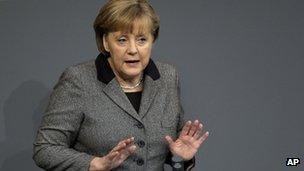Eurozone agrees ECB banking supervision rules
- Published
- comments

The German chancellor welcomed the deal hours afterwards in the Bundestag
European finance ministers have reached a deal on rules for supervising eurozone banks, ahead of an EU summit.
Around 200 of the biggest banks will come under the direct oversight of the European Central Bank, which will act as chief supervisor of eurozone banks.
The agreement, external - a key step towards banking union - will be put before European leaders later on Thursday.
New rules on prudent banking are seen as vital to bolster the euro, as bank failures triggered the financial crash.
The measures are also aimed at preventing banking failures, of the type that happened in Greece and Spain, ending up on the books of eurozone governments.
Hours afterwards, eurozone finance ministers agreed formally, external to release a long-delayed instalment of 34bn euros (£27bn; $44bn) to Greece over the next few days, with a further 15bn later on. Athens has been waiting for the bailout funding since June.
'Core demands'
It took 14 hours of talks that lasted almost until dawn on Thursday for EU finance ministers to finalise the banking deal.
German Chancellor Angela Merkel welcomed the agreement, telling the Bundestag (lower house of parliament) that Germany's "core demands" had been secured. "It cannot be praised too highly."
She has previously warned against rushing into banking union out of concern that Germany would face further financial demands.
Significantly, a large number of French banks will be supervised by the ECB but rather few institutions in Germany will, because of its fragmented banking industry, says the BBC's Business Editor, Robert Peston.
European Commission President Jose Manuel Barroso hailed the deal, external as "a crucial and very substantive step towards completion of the banking union".
UK Prime Minister David Cameron said the agreement ensured "that the single market is protected for countries that are not signing up to the banking union".
'Significant transfer'
For months, the threshold at which the ECB would act as chief supervisor has been the subject of strained negotiations.
Under the deal expected to take effect in March 2014, banks with more than 30bn euros ($39bn; £24bn) in assets will be placed under the oversight of the European Central Bank.
The ECB would also be able to intervene with smaller lenders and borrowers at the first sign of trouble, the BBC's Europe Editor Gavin Hewitt says.
Europe's finance ministers have taken another major step towards closer integration, with a significant transfer of authority from national governments to the ECB, he says.
The EU had already agreed that the ECB would act as chief supervisor of eurozone banks.
But the deal gives the ECB powers to close down eurozone banks that do not follow the rules. It also paves the way for the EU's main rescue fund to come to the direct aid of struggling banks.
It represents the first stage of a banking union - known as a Single Supervisory Mechanism (SSM) - which EU leaders believe can be put in place without having to change EU treaties.
While the European Central Bank will be responsible for the overall running of the SSM, it will be in close co-operation with the supervisory authorities of member states and the EU-wide European Banking Authority, which creates banking rules across all 27 member states.
But there have been some legal doubts about the subsequent stages - a joint deposit guarantee scheme and a joint resolution mechanism for winding up broken banks.
The UK, which is not in the eurozone, will not be joining the banking union but has won some protection against being marginalised when key decisions are taken, our Europe editor says.
London is the EU's main financial centre, and handles by far the biggest share of euro foreign exchange transactions. So the UK government is anxious to safeguard the City's powerful role and prevent its business leaching to a more integrated eurozone.
The UK and Denmark both have formal opt-outs from the euro.
The other EU states still outside the euro are committed to joining, and can sign up to the banking union in the meantime, although Sweden and the Czech Republic have made clear they will not.
Deeper integration
A report, external on far-reaching eurozone integration, by European Council President Herman Van Rompuy, will be discussed at the Brussels summit later on Thursday.
But EU leaders are likely to avoid any measures that could trigger treaty change before the European elections in mid-2014, because treaty change is nearly always a thorny issue for the EU.
It took seven years for the EU to adopt the Lisbon Treaty.
There is strong opposition in Germany and other richer eurozone nations to any further taxpayer-funded bailouts of indebted banks and governments.